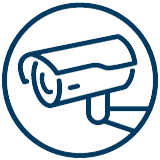|  | Know better. Do better. |  | DataveillanceAI, privacy and surveillance in a watched world |
|
| | Police across the UK are ramping up their use of facial recognition tech despite warnings of privacy risks.
At a Beyonce concert last week, thousands of fans had their biometrics scanned live by South Wales Police. Their facial data is checked against a database and kept by the police for 31 days before being deleted.
Katy Watts, a lawyer for rights group Liberty, told the BBC that the use of the technology is "violating the privacy of thousands of people to make only potentially one or two very minor arrests".
Government ministers are planning to include facial recognition with police bodycameras, when previously it had only been used at large events.
Police say the technology will be instrumental in tackling crime. But live facial recognition resulted in just one arrest out of the 68,000 faces scanned during King Charles' coronation in May, figures show.
The police said they "regret" the arrests.  Metropolitan Police officers march along the route of the 'King's Procession', in central London, on May 6, 2023, ahead of the Coronation of King Charles III. ADRIAN DENNIS/Pool via REUTERS |
"These statistics raise legitimate questions over the proportionality of such tactics", Pete Fussey, a senior lecturer in criminology at the University of Essex, told The Guardian.
"The established legal principle (is) that the human rights of all those whose faces are scanned are engaged, whether they are wanted by the police or not."
Rest of the world: what’s new?
Africa
Nita Bhalla, East Africa correspondent
Digital rights groups are calling on authorities in Guinea to ensure citizens have unrestricted access to internet services following disruptions which started last week.
According to NetBlocks, social media and messaging services have been severely limited following a call for demonstrations by the Forces Vives - a group of civil society groups and opposition political parties contesting the military junta.
"Guinea has a disastrous track record when it comes to shutting down the internet to quell protest and silence dissent during key national events," said Felicia Anthonio, #KeepItOn Campaign Manager at Access Now. |
 City dwellers are seen walking amongst cameras in this illustration. Thomson Reuters Foundation/Tereza Astilean |
This piece compliments a Context investigation published earlier this month which tracked the expansion of new public-private surveillance camera partnerships in smaller and mid-size cities and towns, powered by a growing police tech-startup called Fusus.
Asia
Vidhi Doshi, India correspondent
China has banned U.S. memory chipmaker Micron's products for key infrastructure projects after it failed a network security review.
An escalating technology war between Beijing and Washington has seen the U.S. impose a series of export controls on China's chipmaking technology and moves to prevent Micron rival Yangtze Memory Technologies from buying certain U.S. components.
The retaliation from China could mean U.S. chips are banned in sectors from telecoms, to transport and finance in the world's second largest economy.
Latin America
Diana Baptista, Mexico correspondent
The top human rights official in Mexico – and a close ally to President Andrés Manuel López Obrador – was targeted with spyware Pegasus while he investigated human rights abuses by the military, according to The New York Times.  Mexico's Undersecretary of Human Rights Alejandro Encinas speaks at the National Palace, in Mexico City, Mexico August 18, 2022. REUTERS/Henry Romero |
The use of spyware against human rights defenders and journalists has been extensively reported in the country. This is the first documented case, however, in which a senior government member so close to the president has been targeted.
Activists expressed concern over the growing power of the military, the only entity with access to Pegasus in Mexico, and worried "there's no democratic control over the spy tool". |
|
|
| | Like the colonial conquests of the past, in today’s space race, indigenous people are losing their land and identities | Demand for AI-driven security systems jumped after the Uvalde shooting, but concern is growing over ethics and effectiveness | TikTok's collection of user data is raising privacy and national security concerns across the world | As U.S. lawmakers move to force TikTok's Chinese parent company to sell the app or face a ban, here is a look at other global curbs | |
| |
| | | |
|